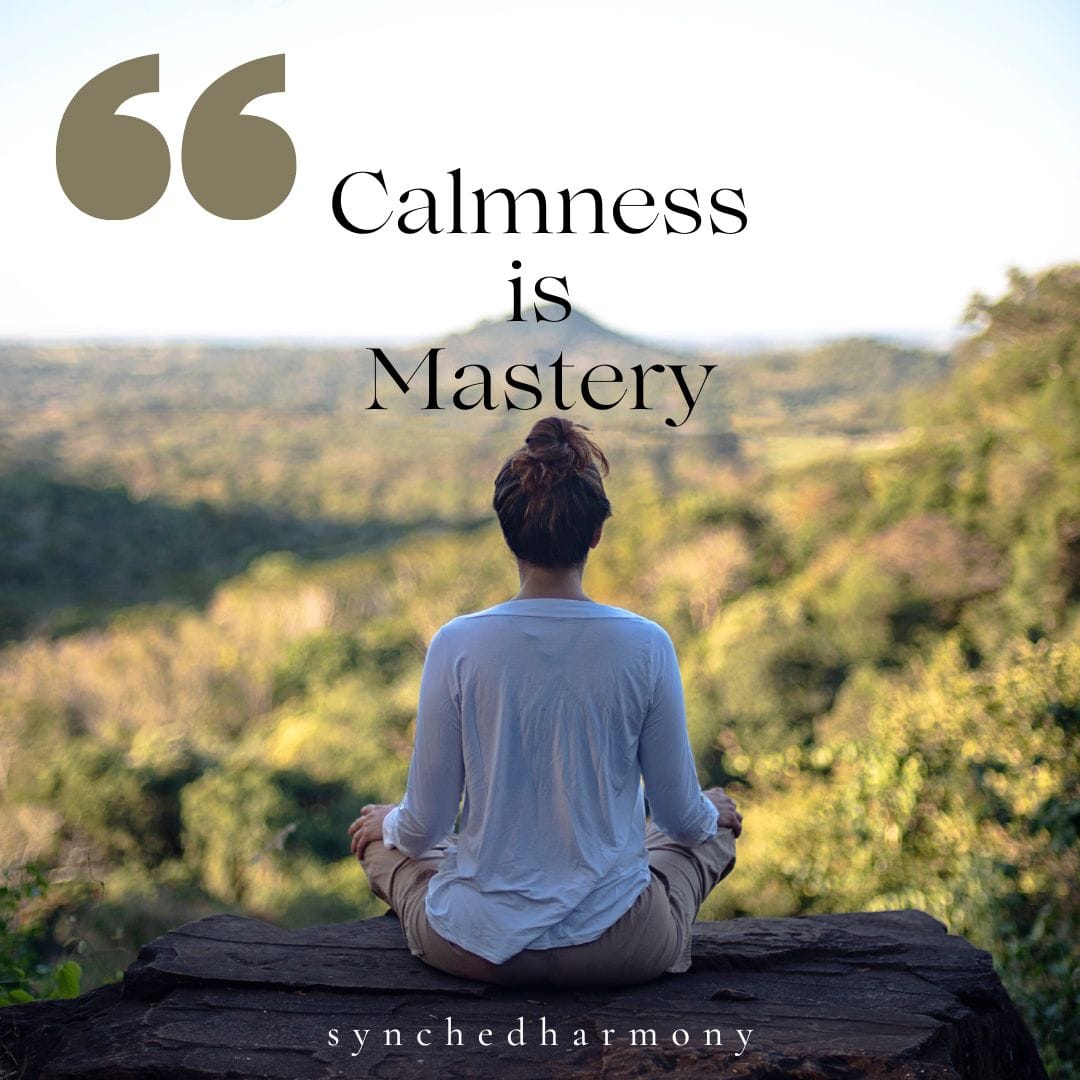I was looking for a positive motivation to guide myself on the path to serenity while scrolling through the internet, I came across a powerful life quote, “Self-control is Strength. Calmness is Mastery. You – Tymoff”.
An individual who knows the importance of self-control and calmness will understand this quote better. These two traits hold significant meaning on their own, and the main purpose of this article is to understand the relationship between them. We will grasp the importance of self-control and calmness and understand its significance in mastering self-control. In the end, we will focus on covering some thought-provoking topics, so stay tuned till the end.
What is Self-Control or Self-Discipline?

Self-control is very closely related to your emotions, while we will focus on covering emotions in detail in a separate blog post, in this article, self-control or self-discipline is mostly about controlling your emotions and inner feelings.
Emotions are what make us humans. If we didn’t have emotions, there would be no difference between us and a programmed machine. Having emotions and feelings gives us a purpose in life, we stay connected with our dear ones and care for each other.
Emotions teach you the true meaning of life, help you understand the difference between morally correct and incorrect decisions, and make you a responsible individual. Without emotions, our lives would have no purpose, and we wouldn’t be able to imagine how the world would look without emotions and feelings.
But it is important to understand that if we emphasize the importance of having these emotions, why are we then talking about controlling them? Our body has certain senses that make us aware of the pleasures and pains of the world, and these senses are inherent from birth. Keeping these senses under control is self-control and self-discipline.
Our senses lead us to experience both good and bad things in life. These experiences develop our sentiments and emotions, which create a unique perspective towards the world. Often, there is a human tendency to hold on to experiences that bring us happiness, not wanting to let go of those moments. On the other hand, we want to quickly forget the experiences that we consider bad, as enduring them becomes beyond our capacity to tolerate.
When you can remain emotionally stable in moments of happiness and keep striving without losing hope in times of adversity, you have learned to self-control your emotions. Self-control or self-discipline means controlling your emotions and feelings in any situation or circumstance, not letting them overpower you. In such situations, listening to your mind over your heart is often called self-control. When you have self-control over yourself, you don’t let your emotions flow freely, you don’t let them dominate you, which weakens your morale.
Self-control is Strength. Calmness is Mastery. You – Tymoff

Psychologists Roy F. Baumeister and Kathleen D. Vohs proposed the strength model in their study The Strength Model of Self-Control, suggesting that self-control operates like a muscle that can become fatigued with overuse but can also be strengthened over time through practice. Their research indicates that self-control is vital across various domains, including eating, drinking, spending, and interpersonal interactions. Establishing self-control can be a challenging task and the below tips can help establish self-control:
Be Focussed
Being focused is crucial in life to establish self-control over your emotions. Focus means having goals in your life that are your main priorities, and if you are unable to control your emotions and feelings, then achieving these goals can be difficult. When you stay focused, you automatically think of eliminating all the distractions that are hindering the achievement of those goals.
Also Read: 10 SMART Goals For Success in 2025
Divert from Distractions
Self-control means avoiding distractions that weigh heavily on your emotions and sentiments. Try to divert your mind towards activities that make you more productive and focused, and make a conscious effort to avoid distractions that derail your focus from your goals. When you feel tempted by these distractions, have something that can pause and force you to reconsider your choices.
Meditate
Emotional overflow often occurs due to having various thoughts running through your mind, which prevents your mind from focusing on your goals. When your mind is occupied with many things, it becomes challenging to judge right from wrong, and then you are naturally driven by your emotions rather than your mind. This emphasizes the importance of meditation, which helps you control your thoughts. We’ll discuss this in detail in upcoming articles.
Avoid Temptations
Avoid anything that can undermine your self-control level, whether it’s a distraction or a triggering activity that prevents you from exercising self-control. The best way to do it is to force yourself not to do that or have someone who stops you from those temptations. You need to prevent yourself from facing those triggering points and create a situation where these trigger points don’t affect you.
Fortify Your Mind
To practice self-control, it’s essential to have a strong mind. You’ll need to start engaging in activities that strengthen your mind, challenge yourself with tasks that are important to complete, and gradually increase the difficulty level of these tasks. It’s important to set aside emotions and develop an analytical and logical mindset where you analyze everything in detail and think multidimensionally. Exercise your mind and improve your level of self-control.
Change Habits
Changing habits is very important to achieve self-control. Habits are part of our daily routine, which we follow consistently. When something becomes part of our routine, it becomes difficult to change. It’s necessary to change the habits that are preventing you from achieving self-control. You need to create a schedule in which bad habits are replaced with good ones that make you more productive.
Must Read: 10 Habits That Will Make You UNSTOPPABLE in 2025
Set Milestones
You cannot achieve self-control overnight or in a few months; it is an improvement gradually gained. It’s not about working on self-control for a few days and then giving up. Your achievements should be measurable milestones. These milestones should be challenging, and their difficulty level should gradually increase. You should reward yourself after reaching a milestone, but do not let your emotions overpower you. Instead, focus on preparing for the next checkpoint.
Read and Learn
To achieve self-control, your mind needs to be enlightened. You should read and learn from things that motivate you to control your emotions. When we read something, we discover aspects that can help us become more resilient. Therefore, eliminating distractions and gaining knowledge is more beneficial in mastering self-control. You can only make it your strength when you understand it thoroughly, inside and out.
Prioritize Other Things
We often fail to control our emotions because we give them more value as compared to other priorities in life. When you lack self-control, numerous thoughts keep running through your mind, consuming all your time. In such circumstances, it’s important to prioritize other significant things that matter to you. Having goals is crucial as they prevent you from getting distracted and keep you focused.
Weigh Benefits
Another motivational factor for achieving self-control is considering its benefits and cons. Identify role models and follow those who have achieved great level of self-control. Gradually, you will notice a positive change in your thinking that will motivate you to attain self-control. When you are under the right influence, your grooming aligns in that direction, and your mentality develops accordingly.
Why Self-Control is Strength?
Below are 10 powerful reasons that make self-discipline your core strength:
1. Teaches You Patience
Self-control teaches you patience, which is crucial to maintain in any challenging situation. When you learn to control your emotions and feelings, your behavior automatically becomes more composed. This helps you use your mind more than your emotions when making decisions. Consequently, you don’t let your emotions overpower you and you make thoughtful and well-considered choices.
2. Control of Emotions and Desires
Controlling emotions is a challenging task, and those who learn to do so become strong and emotionally resilient. Our emotions and desires can become significant distractions during important moments in life. However, if we learn to control them, we can use these emotions as a source of strength during tough times. We need to know how to use our emotions at the right time and not let them overpower us.
3. Improved Focus
When you learn to control your emotions, your focus on your goals also increases. You can easily tackle distractions and obstacles that come your way and think more logically about things. Your attention shifts from multiple distractions to priority items, and you can better decide what is right and wrong in those matters.
4. Prioritize Things
When you use your mind more than your heart, you can prioritize things better in life. You realize the importance of time and where you need to be focused at that moment. Self-control teaches you to manage your emotions, allowing you to pay attention to things that you might otherwise not give due importance to.
5. Calculated Decisions
Your decision-making ability improves significantly because you start thinking logically and analytically rather than emotionally. You take an interest in understanding the situation and try to think about it from every angle, putting emotions aside and considering it multi-dimensionally. In this way, your decisions are never biased or driven by emotions, rather, they are calculated and support the best possible scenario.
6. Handles Stress
By gaining control over your emotions, handling stress and tension becomes much easier because you prevent your emotions from overflowing in challenging situations. Self-control teaches you to act patiently in tough situations and prevents you from making hasty decisions. When you have self-control, you remain calm and composed even in difficult situations, which naturally helps you manage stress effectively and make the right decisions.
7. Non-Greedy
With self-discipline and control over your emotions, you don’t develop greed for anything. You manage your desires well and don’t let your emotions overpower you. You don’t get attached to luxuries, you live comfortably with the bare minimum necessities. Anything beyond the basic necessities becomes a delight for you, and you learn to live without them as well.
8. Improved Health and Wellbeing
By controlling your emotions, your mental health and emotional well-being improve significantly. You don’t overreact in any situation and handle everything peacefully and calmly. Your stress levels are reduced, and you become well-prepared to face any situation. Your focus on your goals remains strong, and distractions can’t easily disrupt them.
9. Manage Challenging Situations
Self-control helps you face challenging situations where it is crucial to use your mind more than your heart. When you have control over your emotions, you can think about dealing with the situation logically, which helps you brainstorm many ideas. By keeping your emotions in check, you can prepare for outcomes that you might not have considered otherwise.
10. Self-Regulation
Self-control teaches you to handle yourself in tough situations and move forward. It teaches that joy and sorrow are temporary and spending too much time on either is futile. It’s important to stay focused and progress towards your goals, rather than getting carried away by emotions in moments of happiness or getting too disheartened in moments of sorrow.
Calmness is Mastery – The Art of Emotion Control
The greatest mastery is staying calm in moments of chaos. Often, in tough situations, we hesitate, and in that anxiety, we make mistakes that worsen the situation. As per the research conducted by Juan Xi and Matthew T. Lee in Inner Peace as a Contribution to Human Flourishing: A New Scale Developed from Ancient Wisdom, inner peace enhances well-being for both religious and secular individuals, indicating its universal value.
Sikka Pillerin of Standford University conducted a study on Individual differences in peace of mind reflect adaptive emotion regulation which indicates that individuals with adaptive emotion regulation skills experience higher levels of peace of mind. This suggests that the ability to manage emotions effectively leads to a calmer mental state, reflecting personal mastery.
Quick Tip:
Practicing calmness is the most important skill, and mastering this skill should be a life goal for everyone.
What is Calmness?
It’s the highest form of self-control over your emotions. When you become so skilled at controlling your emotions that you never let them overpower you, you reach the mastery level of calmness.

Imagine you are stuck in a situation where everything goes against you, and you slowly start losing your patience. In such a situation, there will be moments when you will completely lose your patience, leading to an emotional outburst. After that, you won’t have any idea what to do next. However, one thing is certain, instead of controlling the situation it can become even worse.
When we are in a tense situation, we often end up making mistakes because we are not fully using our minds. In tense situations, if your emotions overpower you, you lose control over yourself and cannot understand what is happening. In such situations, the chances of things getting worse increase.
Stress leads to overbursts of emotions that overpower your mind. If you do not let these emotions overpower you and remain calm in challenging circumstances, you can tackle tricky situations with ease.
Self-control involves learning to control your emotions and keeping them in check. As you gradually master your emotional control, you start to reach a level of calmness. Essentially, the more you exercise self-control, the more you gradually master calmness. Therefore, understanding this interrelationship between self-control and calmness is quite important.
You can also relate a calm state to meditation. Usually, when you meditate, you let go of all the thoughts running through your mind and focus solely on your breath until your entire attention is centered on it. Gradually, your focus shifts from your breath to other parts of your mind and body, and amidst all this, the numerous thoughts in your mind disappear, and you find yourself in peace.
Similarly, in any tense situation, thousands of thoughts and emotions trigger in your mind, you learn to control them to such an extent that they become as insignificant as a small amount of stress, and you can use your entire thinking to deal with the situation logically and tactfully. When you can implement this, finding a solution-oriented outcome for any situation becomes easier, and all your energy remains focused only on one thing.
How Do You Master Calmness?
The biggest thing is how you achieve this greatness, right? How do you master calmness? What can you do to keep yourself calm in any situation? Follow the points below, it will help you achieve the highest level of calmness.
Meditation
Meditation is the foremost and most beneficial way to master calmness. As I explained earlier, through meditation, you try to focus on just one thing at a time, which helps other thoughts in your mind naturally fade away, making you feel calm and composed.
Quick Tip:
Mindfulness meditation enhances emotion regulation by increasing self-awareness and reducing emotional reactivity. The effect of 15 minutes of meditation in the daytime helps you exercise great control over your emotions and mental health.
Enough Sleep
When we let our emotions take control of us, it significantly affects our sleep, and it’s quite obvious that when sleep remains incomplete, irritability is inevitable. If you want to achieve mastery in calmness, the first thing to do is improve your sleep schedule.
Quick Tip:
Aim for at least 7-8 hours of sleep and avoid using electronic devices at least half an hour before bedtime and after you wake up. Try to ensure that your mind is completely free before sleeping, and for this, I highly recommend a short night walk after dinner.
Healthy Diet
Start having a healthy diet, and avoid foods that increase your blood pressure or cholesterol levels. Enjoy all vegetables and eat only as much as you need. Keep your stomach around 80% full after meals, and avoid overeating. Remember to eat to live, not live to eat.
Exercise
This is a very important factor in achieving calmness. When you create a schedule and exercise daily, discipline automatically comes to you. Exercise doesn’t just mean building the body muscle but also keeping yourself fit. I recommend that you at least run 1 km daily. Running teaches you to balance your mind and pushes you beyond your potential.
Connect with Nature
Step out of social media and connect with nature. Go for a morning walk before sunrise and experience the morning’s tranquility. The chirping of birds and the gentle rays of the sun make you calm and composed. Dedicate this time in the morning just for yourself, and while enjoying the beauty of nature, you can also plan your daily routine.
Set No Expectations
Don’t keep any expectations from anyone. Where there are expectations, many times you may also have to face disappointment, and experiencing disappointment means an outburst of emotions. In such cases, don’t allow yourself to feel disappointed. Adopt the mindset that things will remain as they are, and there’s no benefit in thinking about what will happen in the future. Keep your focus on your goals.
Practice Forgiveness
Learn to forgive others; there’s no benefit in holding grudges. Forgiving others allows you to release the emotional outburst trapped inside you, so learn to forgive, forget, and move on. This is truly a good way to move forward in life. When you forgive someone, you feel lighter inside and don’t hold anything against them, which is very important for achieving mastery in calmness.
Learn to Let Go
You need to learn to let go of certain things; it’s essential to understand that attaching yourself to something without reason brings no benefit. It only increases your stress and leads to facing disappointment. You can achieve calmness only when you control your stress and tension levels. If you remain attached to grudges in your mind, sooner or later, there will be an emotional outburst. That’s why it is important to learn to let go.
Gain Knowledge
Absolutely! Keep learning something new every day and maintain curiosity. Knowledge is indeed power, happiness, and a path to mastering calmness. Develop a curious mindset and show interest in things that can improve you. Approach tasks with dedication, whether big or small, enrich yourself with knowledge.
Be Kind
Lastly, be a good person and treat others well. Don’t expect that if you treat others well, they will treat you the same way. Not everyone in the world is equal. If you want to achieve mastery in calmness, everyone doesn’t need to have the same intention. Respect all living beings, whether animals, humans, or anything else. Maintain patience in your nature and appreciate the beauty of the world.
Conclusion
To Conclude, Self-control is Strength. Calmness is Mastery. as it makes you internally strong and emotionally stable. Self-control isn’t just about controlling your emotions and impulses but also about using them in the right place to build your power. While calmness is about achieving the highest form of self-control.
There are many ways to improve self-discipline, with the most beneficial and efficient being meditation, which teaches you to focus. Ultimately, self-discipline teaches you patience and lets you stay focused, enabling you to manage stress effectively and improve your overall health and well-being. When you start mastering self-control, you will gradually also learn to master calmness and that’s the beautiful interrelation between the two. Subscribe to Synched Harmony for motivational and inspirational content!

Greetings! I am the voice behind the thoughts presented on Synched Harmony. As an ordinary individual, I strive to live a life dedicated to achieving inner peace and serenity by cultivating harmony within and making difficult aspects of life work together in sync during tough phases of life. Life becomes much easier if we open ourselves to small changes and respect each other’s personal boundaries, creating space for shared happiness.

7 thoughts on “Self-control is Strength. Calmness is Mastery. You – Tymoff – 10 Powerful Reasons”